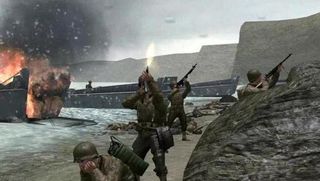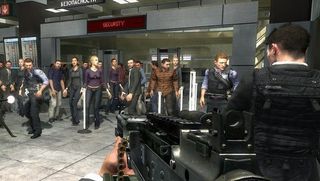Call of Duty will always have its detractors, but I'm proud to say that I'm not one of them. A franchise that has sold over 125 million units (and counting) and one with a fan base of players who have racked up a, frankly alarming, 1.6 billion hours of online play on Modern Warfare 3 alone, is bound to attract the ire of many. The series has become so rooted in console gaming lore that it is now impossible to imagine the industry without it, but just how deeply are its effects felt?

It is worth pointing out that Call of Duty began life as a PC title way back when shooting up your friends online was something one could only achieve with a keyboard, mouse and a heady 1MB broadband connection. Of course, those who tucked into the delights of the original Call of Duty back in 2003 had already experienced the wonders of Counter-Strike and Quake III Arena, so the marvel of connected gameplay was not such a new thing. For those playing Call of Duty 2 over Xbox Live, however, the world just got a little bit more amazing despite the early excellence of Halo 2 on the original Xbox.
Those who cut their multiplayer teeth on an early Call of Duty game will remember how quickly everything happened. In the early days, before Modern Warfare came out, Call of Duty was one of the few games that you spent more time playing than sat round in a lobby. When Modern Warfare took the world by storm, players were offered more multiplayer sessions than they could shake an AK-47 at. Matches were tight and well balanced, and progress was utterly addictive. Playing CoD online wasn’t just fun: it was easy, and I (among many) found that very important. It perfectly married the convenience of consoles with gameplay that was quick, enjoyable and easy to understand.

By Call of Duty: Modern Warfare 2, the series had begun to unlock its potential as one of the biggest selling media products on the planet, and its single player campaign reflected the Hollywood comparisons it so craved. Set pieces became more precise and dynamic, although scripts and stories grew larger holes. The campaign became more about shock and awe, grizzly moments married to ever more over-the-top set-pieces--perfect fodder for tabloids that still struggled to (or maybe they just prefer not to) understand modern video games.
The success of a franchise so steeped in violence (it is a game about hosing down Russians with high powered rifles after all), would always attract controversy--some well-meaning, other spuriously motivated. Labour politician, and long-time videogame detractor, Keith Vaz was not particularly fond of Modern Warfare 2’s ‘No Russian’ level, raising his concerns in the House of Commons. Despite his anxiety that the moral fibre of the youth of Britain was being eroded by the horror of Call of Duty, the game passed uncut though the BBFC’s stringent classification system, becoming the first title in the series to be handed an 18 certificate.

As well as being a target for outraged pressure groups, Call of Duty also receives a great amount of stick, unfairly perhaps, for those who dislike both the commercialisation of the industry and perceived narrow reach of the games’ fans. Despite this perception, the current generation has embraced indie gaming like no other, and this progress is diametrically opposed to the familiar format found in Call of Duty’s successive titles. There's room for both types of game, and in many ways, COD can count itself partially responsible for triggering indie's counter-cultural kick against AAA. Gamers want experiences that are the exact opposite of COD's mass-produced bombast.
So, after 10 years, the franchise has been round the block a few times and is about to enter untold territory (well, not entirely untold--this is Call of Duty) with the new console generation. What is quite telling is how, over the course of some years, many of the staples of the Call of Duty series have slowly become staples of the shooter genre. It’s rare to see an action game hit the market without a multiplayer component of some sort, despite it perhaps not fitting in with the game’s tone or having any fresh ideas of its own. Equally, smaller aspects of the franchise that were originally unique to Call of Duty have been borrowed and blended in with nearly every FPS that has followed it, which has led some to criticise those imitators, while at the same time, lambasting COD culture for the wealth of military-style shooters that are kicking around at the moment.

When measuring the impact of the Call of Duty franchise, the simplest answer is that it broadened the appeal of online FPS games on consoles beyond the success of Halo 2 which, while massively popular, was only available to those with an Xbox. We now find ourselves in a situation where the FPS genre is the most popular on consoles (in most markets), something that would have been considered impossible ten or 12 years ago, and this is due largely to the success of Call of Duty. It has also created a thirst for online play that most action games attempt to quench, removing any form of elitism and complication from the endeavour
Call of Duty not only helped console gaming attract a wider audience, it may also be the defining franchise of the entire generation and, for better or for worse, it looks like it’s here to stay.

